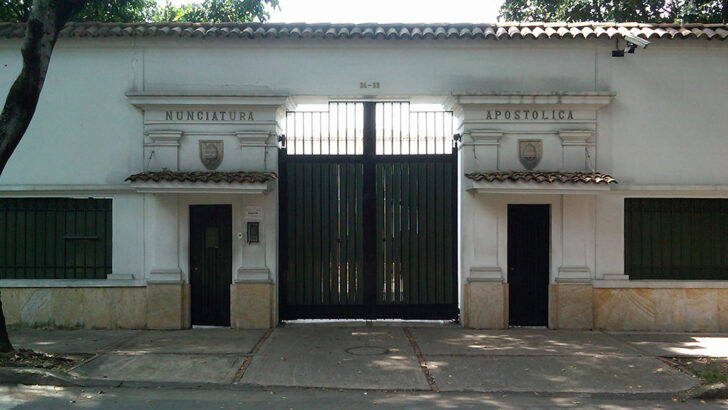After two days occupying the apostolic nunciature in Bogotá, protestors agreed to leave.
They were protesting the violence of paramilitary groups against community leaders and Indigenous peoples and will now hold a meeting with the government about potential solutions.
The group of about 15 activists got into the area on June 4, during a march that had began in front of the Interior Ministry. They were members of a civic organisation called Congreso de los Pueblos (Congress of the Peoples), which gathers 600 different community and social justice associations. They were promoting a “national mobilisation for life and permanence in the territories.”
They ended up setting up a ‘humanitarian refugee camp’ at the nunciature’s parking area.
The group also included Indigenous and peasant activists, and put up road blockades in different regions of Colombia.
The demonstrators’ main goal was to demand of the government the urgent demobilisation of the right-wing paramilitary groups that have been operating in the South American nation for decades.
Initially established by conservative forces in order to combat communist guerrillas as the Revolutionary Armed Forces of Colombia (FARC), the paramilitary organisations gradually began to control vast territories and got involved in delinquency.
Left-wing groups like Congreso de los Pueblos accuse the paramilitaries of harassing entire communities and killing their leaders.
That was the case, for instance, Narciso Beleño, a long-time peasant leader in the Bolivar department who was shot dead on April 21 after denouncing the presence of paramilitary forces in the region.
According to the Institute of Studies for Development and Peace (INDEPAZ), at least 72 community leaders have been killed in Colombia so far in 2024.
Some of the demonstrators also occupied offices of the Interior Ministry.
Congreso de los Pueblos said in a statement that the national government must “adopt effective measures to dismantle paramilitarism, taking into account its growth through the territories, controlling – either through terror or cooptation – the autonomous action of communities, putting their existence at risk.”


 Apostolic Nunciature in Bogotá
Apostolic Nunciature in Bogotá 